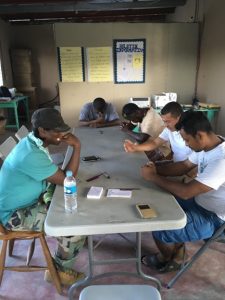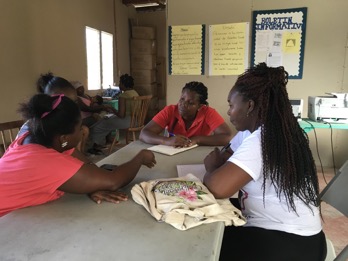
Money and the Bible
April 27, 2017
Serving Contextual Communities: The Bond Model
May 4, 2017Engaging Community Leaders of a Marginalised Group

By Rev. Dr. Rachel Rajagopal
In the last three months, I hosted meetings with various groups of Garifuna leaders from the Atlantida region of Honduras. My stipulation to the Garifuna community leader who was helping me coordinate these meetings was very clear: only those aged 21 years – 50 years were to be carefully selected and invited. They needed to be current or emerging leaders in the community.
After much prayer, I decided to conduct meetings with four different groups:
- Single female leaders
- Young adult leaders
- Single male leaders
- Young adult married couple leaders
 Among the 8,000 Garifunas in one community, I would be able to listen to the voices of at least 30-40 leaders, current and emerging. My intercultural studies have taught me to listen to the people on the ground and to learn from them. After two years in Honduras where one year was spent making inroads into the community and building trust, I could finally get to know their heart for the community.
Among the 8,000 Garifunas in one community, I would be able to listen to the voices of at least 30-40 leaders, current and emerging. My intercultural studies have taught me to listen to the people on the ground and to learn from them. After two years in Honduras where one year was spent making inroads into the community and building trust, I could finally get to know their heart for the community.
The people I dealt with were grassroots leaders; they could make things happen if they desired. Not all were Christians or highly educated, but at least 80 percent had leadership qualities and desired transformation in their community.
Sometimes, missionaries gifted in organizing events and projects tend to dictate what and how things should happen. This is a great temptation to quickly jump in and give all the solutions. It would be far better to create a space where participants can contribute their solutions for their community problems.
Make listening to others a personal goalThe participants were not necessarily Christian, but I had already informed the community leaders that all my meetings would be conducted from a biblical perspective. By this I meant that we would begin and end with prayer, and I would not hesitate to speak from the Scriptures when dealing with leadership issues. It was necessary for me to operate in integrity. Now, there is freedom of religion in Honduras, so this should not be a problem. However, we do live in a world where people can still be hostile toward the Gospel and Gospel messengers. What do you do in such circumstances?
I have chosen not to compromise my faith in Christ. For example, one time in the Middle East, I was among Arab Muslim women and one of them was open to prayer. All my other Arab Muslim friends knew that I believed in the Lord Jesus Christ. So, I told them that I would end my prayer in the name of Isa Al Masih since I believe in Him and asked my friends if they would be open to this. Move on if permission is granted; if not pray quietly for them.
No hidden agenda – exercise integrityWhen we are honest, open and unafraid to be who we are in Christ, people begin to respect us and our confidence. Proverbs 11: 3 states “The integrity of the upright guides them, but the crookedness of the treacherous destroys them.” (ESV) Some will understand that the confidence comes from Christ, but so many are not aware of this possibility.
What an opportunity to share the good news of being secure and confident in Christ! An arrogant person will never be a winner in anyone’s eyes. Therefore, as Christ has already exemplified, let us win the respect of others with our humility before God. Be a true champion of and for Christ.
A humble and respectful attitude is a champion’s attitudeBefore my meetings with the Garifuna groups, I decided that each participant should be treated and recognized as leaders. The community leader informed the participants to attend the meeting with the mentality that it was a community leadership meeting—so, they were to be appropriately dressed, be punctual and be willing to contribute to the discussion. I made sandwiches, baked a cake and offered soda drinks when we met at the community office. When we met at a local restaurant, my ministry paid for light refreshments.
Offer clarity in expectations and hospitalityIn a community where time is elastic, life is relaxed and there is little progress on the quality of life. This aspect of Honduran life and culture was and still is a challenge to a Singaporean like me. Patience and focus were key to ensuring the discovery of the Next Generation leaders’ desires to better themselves. Were they interested in their community, and how much ownership would they take in community transformation? Foreign help including a lot of help from the American Christians has been received in this community but why were there no change in the quality of life?
Navigate intercultural challenges with patience for the sake of the Big Picture
Two groups of single Garifuna Women Leaders discussing the top two issues that hinder the effective progress of their community.
Asking the right questions and helping the participants to see that they can do so much more for their own community are two crucial strategies. The participants need to come up with the responses and solutions. My first meeting with each group was to ask the right questions, listen well, challenge accordingly and pray intensely. I ensured that the participants knew that they had permission to correct my pre-conceived thinking about their culture, manner and work ethics.
Ask questions, listen well, challenge accordingly. PRAY! PRAY! PRAY!As I left my first meeting with each group, I informed that I would be praying about each personal and community need, and if they would return for a second meeting, we could decide and act on a small need that could be fulfilled by the end of 2017. There was no pressure for anyone to attend the second meeting. The community need might be small, but each fulfilled need has the potential to impact thousands of Garifuna lives.
It is not my ministry that will change this community. It is the Lord Jesus and the people of the community. I must always remember that my ministry is just an instrument to guide, facilitate and connect the community to others who might be better positioned to help.
In the course of this ongoing interaction with the community, my personal challenges were to remain focused on the vision that God has given and be able to draw the line so that my ministry is not over-extending itself. However, I believe that engagement with any group in a marginalized community will advance if we would:
- Create a safe space for transparent discussion
- Listen well to each participant’s thoughts and concerns
- Exercise integrity in the engagement with any group
- Be a champion of humility and respect the participants
- Lay out each other’s expectations. Be hospitable at the meetings according to your ability.
- Intercultural challenges are real. Be patient in dealing with another culture.
- Ask questions, listen well and challenge accordingly; soaking every interaction and planning in prayer.
Those engaging in training primarily pastoral leaders (as opposed to other types of community leaders) might want to consider implementing these steps when conducting your core leadership meetings or pastors’ meetings.
When the core leadership has been freed to speak transparently, provide insights and solve problems in a safe space created by the main chairperson of the meeting, then progress in team unity despite diversity and one heart to achieve immediate and long-term goals would result in a quiet knowing that it can only be God who has convened the meeting for such a success.
At the beginning and end of it all, keep the Word of God well.
And whatever you do, in word or deed, do everything in the name of the Lord Jesus, giving thanks to God the Father through him. (Colossians 3:17)
ABOUT THE AUTHOR: Dr. Rachel Rajagopal Founder and Executive Director of Faith Ablaze International Ministries, Dr. Rajagopal engages in intercultural and pastoral training in various nations. A Singaporean by birth, she has served the nation as a commissioned officer in the Singapore Armed Forces. She is well-travelled for the purposes of teaching her Christian faith to others and currently resides in Central America. Her passion is to equip men and women so that they might live honorable, Christ-centered lives. You can contact her through www.faim4christ.org or email .
Director of Faith Ablaze International Ministries, Dr. Rajagopal engages in intercultural and pastoral training in various nations. A Singaporean by birth, she has served the nation as a commissioned officer in the Singapore Armed Forces. She is well-travelled for the purposes of teaching her Christian faith to others and currently resides in Central America. Her passion is to equip men and women so that they might live honorable, Christ-centered lives. You can contact her through www.faim4christ.org or email .


